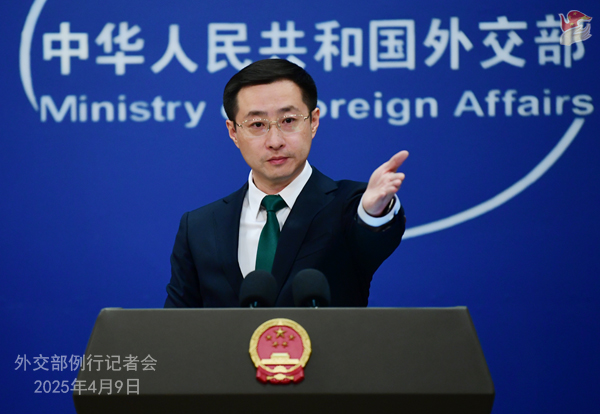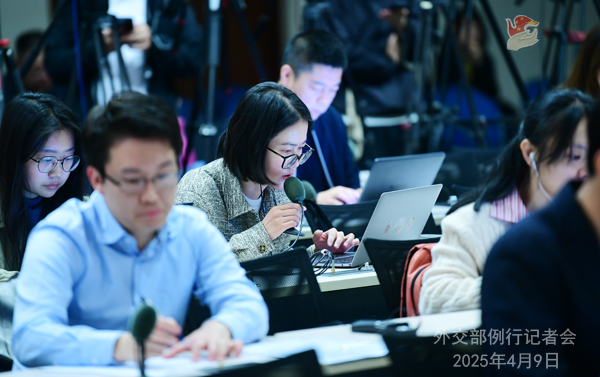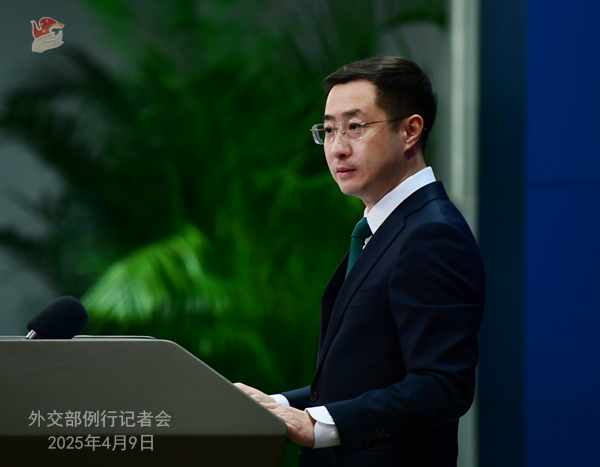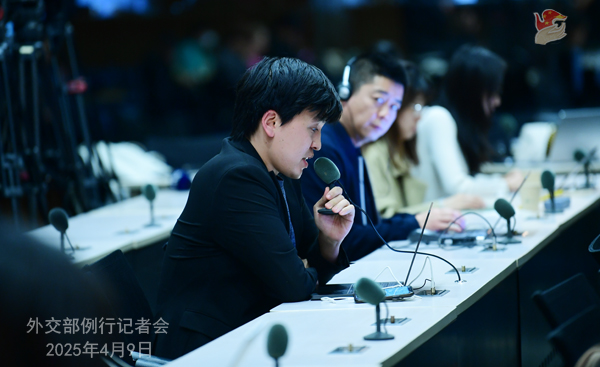
Beijing Youth Daily: It’s reported that during his visit to Panama, U.S. Defense Secretary Pete Hegseth said on April 8 that China’s control of critical infrastructure in the Panama Canal area gave Beijing the power to conduct spying activities across Panama, making Panama and the United States less secure, less prosperous and less sovereign. He said that the U.S. will not allow communist China or any other country to threaten the canal’s operation or integrity. Together with Panama in the lead, the U.S. will take back the Panama Canal from China's influence and keep the canal secure and available for all nations. What’s China’s comment?
Lin Jian: The U.S. senior official maliciously attacked China, and vilified and sabotaged China-Panama cooperation, which once again lays bare America’s bullying and hegemonic nature. China firmly opposes it.
It is so clear for all to see who wants to control the Panama Canal. The U.S. should take a hard look in the mirror to find out who is threatening other countries’ sovereignty, security and development. China calls on the U.S. to stop spreading rumors and making trouble, and stop linking China to the Panama Canal issue with ill intention to find an excuse for America’s attempt to control the canal.
Meanwhile, let me stress that compromise and concession does not protect sovereignty or win respect, but will only embolden the bully.
Anadolu Agency: The U.S. will impose a 104 percent tariff on China beginning Wednesday, the White House said. Spokesperson said President Donald Trump believes China “has to make a deal” and “it was a mistake to retaliate.” It seems the U.S. will pursue the additional tariff raise. What will be China’s response?
Lin Jian: We will not let anyone take away the Chinese people’s legitimate right to development. We will not tolerate any attempt to harm China’s sovereignty, security and development interests. We will continue to take resolute and strong measures to safeguard our legitimate rights and interests.
Hubei Media Group: It was reported that the Japanese government issued the Diplomatic Bluebook 2025 on April 8, which identified Japan’s relations with China as one of the most important bilateral relationships for Japan, and said Japan will continue to promote the strategic relationship of mutual benefit and build constructive and stable relations with China. On the other hand, it still saw China as the biggest strategic challenge Japan has ever faced, and made groundless accusations regarding the situation in the East and South China Seas, China-Russia military cooperation and the security of Japanese citizens in China. What is China’s response?
Lin Jian: China noted this. Japan’s Diplomatic Bluebook for this year continued using the same old rhetoric to blame and vilify China, peddled the so-called “China threat” narrative, and interfered in China’s internal affairs. China firmly rejects this.
China and Japan are important close neighbors. The sound and steady development of the bilateral relations serves the fundamental interests of both countries and peoples. We urge Japan to abide by the principles in the four political documents between China and Japan, have a right strategic perception of China, stop instigating and creating bloc confrontation, and act on its commitment of comprehensively advancing the China-Japan strategic relationship of mutual benefit and building a constructive and stable China-Japan relationship fit for the new era.
AFP: I want to come back on the tariffs question. You just said that China would take resolute actions in response to the new tariffs that have just come into effect today from the United States. Can you give any specific examples or any specific measures that will be enacted by China? Also, as my colleague just mentioned, President Trump has said China is “desperate for a deal.” Is that true? And at what point, if ever, would China refrain from imposing reciprocal like-for-like tariffs on the United States? (Similar question from Reuters)
Lin Jian: The U.S. is still abusing tariffs and exerting maximum pressure on China. China firmly rejects and will never accept such hegemonic and bullying move. If the U.S. truly wants to settle the issue through dialogue and negotiation, it should let people see that they’re ready to treat others with equality, respect and mutual benefit. If the U.S. decides not to care about the interests of the U.S. itself, China and the rest of the world, and is determined to fight a tariff and trade war, China’s response will continue to the end.
Ukrinform News Agency: President of Ukraine Volodymyr Zelenskyy said yesterday that Ukrainian soldiers engaged six Chinese military on the front line in eastern Ukraine. Two of them were captured. How would the Ministry of Foreign Affairs explain the participation of Chinese citizens in the Russian-Ukrainian war, and can you say whether Chinese Embassy in Kyiv are trying to establish contact with above-mentioned personnel?
Lin Jian: China is verifying the information with the Ukrainian side. Let me stress that the Chinese government always asks Chinese nationals to stay away from areas of armed conflict, avoid any form of involvement in armed conflict, and in particular avoid participation in any party’s military operations.

Xinhua News Agency: As the world economy faces severe challenges of rising unilateralism and trade war looms large on the prospects of global economic recovery, certain country’s tariff policy makes the international landscape more uncertain. Meanwhile, we noted that China remains a strong magnet for foreign investment, as evidenced by the recent intensive visits by foreign CEOs to China and the implementation of key projects. Some foreign media and multinationals’ senior executives said that leaving the Chinese market means letting go of a ticket to a decade of economic growth. Optimism for China, upward revision to China’s growth forecasts, and more investment in China have been frequently mentioned by the international business sector, which speaks to the world’s high expectation of the role of China’s economy as an engine. What’s your comment?
Lin Jian: No matter how the international landscape evolves, China’s economy has a solid foundation and sufficient driving forces for steady growth against the odds. With the strong leadership of the CPC Central Committee, the notable strengths of socialism with Chinese characteristics, a solid foundation built up from sustained rapid development, a super-sized market, a complete industrial system and more importantly, the concerted efforts of the 1.4 billion people, China has the confidence and capability to address various risks and challenges. External shocks cannot change China’s economic fundamentals with a stable foundation, numerous strengths, remarkable resilience and vast potential. Nor can they change the consistent trend of China’s steady progress in pursuing high-quality development and robust growth of new quality productive forces.
China’s steady growth brings much-needed stability to the volatile world. China, the second largest economy, has remained the key engine contributing around 30 percent to the global economic growth for years running. As the second largest consumer market with the biggest middle-income population, China continues to unlock the potential of consumption, which turns more and more China’s demands into opportunities for the world. As China’s economy is driven by new quality productive forces, new technologies, products and business formats emerge at a faster pace, which help countries share the benefits of technology. China firmly upholds the rules-based multilateral trading regime, advances trade and investment liberalization and facilitation, and makes the pie of common development bigger. China honors its commitment to high-standard opening-up and continuously fosters a pro-business environment that is market-oriented, law-based and world-class so as to help foreign businesses benefit more from every percentage point of China’s economic growth.
China stands ready to work with all parties to uphold true multilateralism, jointly oppose various forms of unilateralism and protectionism, defuse risks, address challenges and promote a universally beneficial and inclusive economic globalization.
EFE: Spanish Prime Minister Pedro Sánchez is visiting China amid an ongoing trade war between Beijing and Washington. What role does China believe Spain and the EU can play in mitigating the effects of this tension, or even in strengthening economic ties with Asia?
Lin Jian: Premier Li Qiang and President of the European Commission Ursula von der Leyen had a telephone conversation yesterday, sending a positive message to the world. Both China and the EU are advocates of economic globalization and trade liberalization, and firm defenders and supporters of the WTO. The two sides need to jointly safeguard free and open trade and investment, keep the global industrial and supply chains stable and unimpeded, and provide more stability and certainty to the economy of both sides and the world.
Spain is an important economy in the EU. It is also an important cooperation partner of China in the EU. A China-Spain relationship enjoying strategic stability and committed to open cooperation and mutual benefit is conducive to the improvement and growth of China-EU relations.

AFP: President Zelenskyy has said that Ukraine has evidence that “many more Chinese citizens” are fighting alongside Russian forces in Ukraine. Does China know how many of its citizens may be helping Russia in its invasion and have Ukrainian officials previously raised this issue with the Chinese side?
Lin Jian: Such claim has no basis in facts. China’s position on the issue of the Ukraine crisis is very clear and is widely recognized by the international community. The Ukrainian side needs to view correctly China’s effort and constructive role for the political settlement of the Ukraine crisis. As to your question on whether the two sides have communicated with each other, I have no information to offer on that.
AFP: I have another question with regard to China’s position on Ukraine. The Ukrainian Foreign Minister Andrii Sybiha has said that the capture of two purportedly Chinese soldiers “puts into question China’s declared stance for peace and undermines Beijing’s credibility as a responsible permanent member of the UN Security Council.” Does China agree that this incident contradicts its statements on finding a peaceful resolution to the conflict?
Lin Jian: Like I said, China has all along upheld an objective and fair position on the issue of the Ukraine crisis. This is very clear. And China has been committed to ending the conflict and promoting talks for peace, which is clear to the international community. The Ukrainian side needs to view correctly China’s effort and constructive role for the political settlement of the Ukraine crisis.
Reuters: Sources tell Reuters that the Trump administration is considering softening its proposed fees on China-linked ships visiting U.S. ports after a flood of negative feedback from industries that said the idea could be economically devastating. U.S. Trade Representative Jamieson Greer told the U.S. Senate Finance Committee on Tuesday that not all of the agency’s proposed multimillion-dollar fees for Chinese built ships to dock at U.S. ports will be implemented. What is the Foreign Ministry’s comment on this softening of a policy that would affect Chinese vessels visiting U.S. ports?
Lin Jian: We’ve stated our position on relevant questions. Imposing port fees and levying tariffs on cargo handling facilities hurt the U.S. itself as well as others. They will not only push up global maritime shipping costs and destabilize global industrial and supply chains, but also increase inflationary pressure in the U.S. and hurt the interests of American consumers and businesses. The practice will ultimately fail to revitalize the U.S. shipbuilding industry. We urge the U.S. to respect facts and multilateral rules, and stop its wrongdoings at once. China will do what is necessary to defend its lawful rights and interests.
Reuters: The U.S. National Counterintelligence and Security Center warned on Tuesday that Chinese intelligence is using deceptive methods to target current and former U.S. government employees for recruitment, including by “posing as consulting firms, corporate head hunters, think tanks and other entities on social and professional networking sites.” What is the Foreign Ministry’s response to this warning?
Lin Jian: I’m not familiar with what you mentioned. Let me point out that the U.S. has never stopped its espionage activities against China. It has also long been conducting massive surveillance and secret theft against its allies. The U.S. on the one hand blatantly carries out spying activities worldwide, yet on the other hand makes unwarranted accusation of spying threat against other countries. China firmly opposes this irresponsible move.
